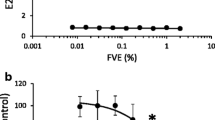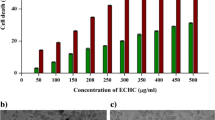Abstract
It is known that species belonging to the lowest metazoan phylum, the Porifera (sponges), do not develop tumors. Sponge cells share with tumor cells of higher animals at least one characteristic; they contain high levels of telomerase activity, suggesting that they possess a high proliferation capacity. This assumption, however, has not been substantiated experimentally. In addition, sponges show a specific bauplan, leading us to postulate that they undergo apoptosis to replace a given set of cells at a given time. In the present study, 17β-estradiol (βE2) was used as a defined agent to assess its effect on both the telomerase activity and the process of apoptosis in the marine sponge Geodia cydonium (Jameson). It was found that βE2 (100 to 500 ng ml−1) caused increased expression (i) of the heat-shock protein HSP70 (Mr=70 000), a cytoplasmic chaperone; and (ii) of the nuclear chaperone thioredoxin (TRX), a protein involved in the control of cancer cell growth. For this purpose the gene of G. cydonium encoding TRX was cloned, and the cDNA was applied for the determination of the expression. Verapamil, an inhibitor of both the mammalian multidrug resistance pump and the invertebrate multixenobiotic resistance pump, was used in co-incubation experiments with βE2 to increase the uptake of βE2. The experiments revealed that verapamil augmented the βE2 effect on the expression of the two chaperones, HSP70 and TRX. In addition, the tissue of G. cydonium underwent apoptosis, and the cells lost their telomerase activity. In parallel with the induction of the apoptotic process, the number of DNA strand breaks increased. It is concluded that βE2 displays its effect via the production of reactive oxygen species (ROS). At physiological concentrations ROS cause the expression of HSP70 and TRX, while at higher ROS levels, generated during the co-incubation period of βE2 with verapamil, the cells undergo apoptosis and lose telomerase activity.
Similar content being viewed by others
Author information
Authors and Affiliations
Additional information
Received: 24 April 1998 / Accepted: 5 August 1998
Rights and permissions
About this article
Cite this article
Wiens, M., Seack, J., Koziol, C. et al. 17β-Estradiol-dependent regulation of chaperone expression and telomerase activity in the marine sponge Geodia cydonium. Marine Biology 133, 1–10 (1999). https://doi.org/10.1007/s002270050436
Issue Date:
DOI: https://doi.org/10.1007/s002270050436




